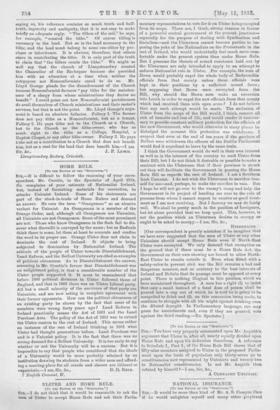MR. LLOYD GEORGE AND NONCONFORMIST TITHE-PAYERS.
[To TUX EDITOR OF TIIR "SPECTATOR."] Sin,—Mr. Lloyd George in his speech in the House of Commons on the Welsh Church refers to this parish.(10 parish iu which he was brought up. If he will forgive me for saying so, his reference contains so much truth and half- truth, ingenuity and ambiguity, that it is not easy to make briefly an adequate reply-. " The tillers of the soil," he says, for example, " created the tithe." Of course tilling is necessary to the land. But so is the land necessary to the tiller, and the land must belong to some one either by pur- chase or inheritance. It is obvious, therefore, that others shire in contributing the tithe. It is only part of the truth to claim that " the tillers create the tithe." We might as well say that the church of Llanystumdwy created the Chancellor of the Exchequer because she provided him with an education at a time when neither the ratepayers nor Nonconformists cared to do so. Mr. Lloyd George pleads for the disendowment of the Church because Nonconformist farmers " pay tithe for the mainten- ance of a clergy from whose ministrations they derive no benefit." I could point out how Nonconformist parishioners do avail themselves of Church ministrations and their• rector's services, but that is not the point. Mr. Lloyd George's argu- ment is based on absolute fallacies. Fallacy 1. The farmer does not pay tithe as a Nonconformist, but as a tenant. Fallacy 2. He pays tithe not to the Church as a Church, but to the Church as the tithe-owner, who has as much right to the tithe as a College, Hospital, a Baptist Chapel, or any other tithe-owner. Fallacy 3. He pays tithe not as a contribution to a Church that does not benefit him, but as a rent for the land that does benefit him.—I am











































 Previous page
Previous page